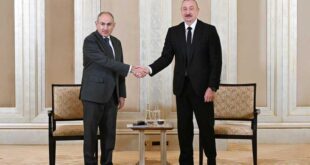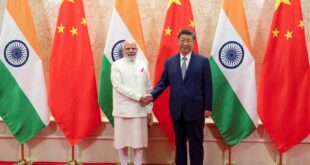War is unpredictable. It was only eight months ago that a conventional war began with Russia invading Ukraine, and now the world may be facing the end of civilization as we know it. This may seem like a stretch of the imagination until we witness the irrationality escalate into what has now become rational.
Russia has made ominous threats to use nuclear weapons in the theatre of war. President Vladimir Putin recently claimed NATO of nuclear blackmail and warned that nuclear winds could blow both ways. He warned that Russia could us all means at its disposal to protect the recently disputed territories annexed in the east of Ukraine which he now considers an integral part of the Russian homeland.
Then Ukraine’s President Volodymyr Zelensky asserted on October 6th that NATO has the responsibility to pre-emptively strike Russia to make it impossible for Putin to use nuclear weapons first. Zelensky followed this statement with an aggressive photo-op by signing an application for Ukraine to join NATO.
On the same day, US President Joseph Biden significantly moved the doomsday clock forward when he stated, “We have not faced the prospect of Armageddon since Kennedy and the Cuban Missile Crisis.” Biden inferred that Putin’s threat is real and the Russian President “is not joking when he talks about using tactical nuclear weapons.”
The 13-day showdown during the 1962 Cuban Missile Crisis had America and the former Soviet Union on the brink of nuclear war. The US had discovered the Communist Regime assembled missile launch systems in Cuba that could deliver nuclear warheads onto American cities in a matter of minutes. While 60 years have passed since Cuba, remarkably the Ukraine crisis is quite similar in some respects; yet a far different approach to a resolution in deescalating the current tensions towards nuclear confrontation.
Reminiscent of the US setting up the offensive Jupiter missiles six decades ago in the NATO partners of Turkey and Italy that were aimed towards Russia and its former satellite Eastern Bloc nations, the Americans have recently set up missile systems in new NATO members of Romania and Poland within proximity of delivering a blow to Russian cities, infrastructure, and military bases.
The dynamics in 1962 intensified quickly with a U2 American plane shot down over Cuba, a US naval blockade circling the island nation, calling up all active air force personnel to their bases, a Soviet submarine with nuclear tipped torpedoes arriving on the scene, a CIA report that all missiles in Cuba were armed and ready, and NATO allies were informed that circumstances were deteriorating and within a short period of time to take whatever military action is necessary. US Attorney General Robert Kennedy recalled the mood, “We had abandoned all hope”. Military confrontation was imminent.
Emissaries were sent by the USSR Chairman Nikita Khrushchev and President Kennedy to meet at a Chinese restaurant to find a path forward. Robert Kennedy and Soviet Ambassador Anatoly Dobrynin met on the sidelines to find a solution. The US deployed 161 nuclear-armed interceptors, twenty-three nuclear-armed B-52s were orbiting near the Soviet Union, and 145 intercontinental ballistic missiles were on standby.
A deal came in the nick of time. Under tremendous pressure, Khrushchev blinked. He sent this message to Kennedy. “You are disturbed over Cuba. You say that this disturbs you because it is ninety-nine miles by sea from the coast of the United States of America. But… you have placed destructive missile weapons in Italy and Turkey, literally next to us…. I therefore make this proposal: We are willing to remove from Cuba the means which you regard as offensive…. Your representatives will make a declaration to the effect that the United States will remove its analogous means from Turkey…”
Kennedy responded. The message read, “As I read your letter, the key elements of your proposals—which seem generally acceptable as I understand them—are as follows: You would agree to remove these weapons systems from Cuba under appropriate United Nations observation and supervision; and undertake, with suitable safe-guards, to halt the further introduction of such weapon systems into Cuba. We, on our part, would agree upon the establishment of adequate arrangements through the United Nations, to ensure the carrying out and continuation of these commitments to remove promptly the quarantine measures now in effect and to give assurances against the invasion of Cuba.”
On October 27, Kennedy secretly agreed to remove all missiles set in Turkey and southern Italy in exchange for Khrushchev removing all missiles in Cuba. Only afterwards was it learned that the Soviets had 162 nuclear warheads in Cuba. The world was at the precipice.
Contrasting to today’s crisis and one must wonder whether substantial efforts and backchannels are taking place to advert an escalation that can quickly spiral out of control as the conflict becomes more entrenched with political positions difficult to crawl out from.
Why didn’t the Biden Administration not act decisively to head off the invasion when Russia was assembling the ground forces months ahead of crossing into Ukraine? Why did Biden state a small excursion by Russia into Ukraine may be permissible? Perhaps this was a green light to create a conundrum for Russia at the expense of allies in Europe. Why would the US not recognize the bigger picture of death, destruction, and billions of dollars sunk into a less than democrat country of Ukraine and simply inform Putin there are no plans to allow Ukraine into NATO. Perhaps the Biden Administration recognized the repercussions for Russia all along.
The wildcard of course is Putin. He is an idealogue that is unchallenged in Russia. He now finds his back pushed up against a wall as the designated pariah of the world. With options to win this war becoming more drawn out and the ability to hold onto the annexed territories in doubt, Putin is more apt to consider the nuclear option if his dogmatic views of Russia’s existence and culture is at risk.
To be clear, we did not move closer to Armageddon with Russia invading Ukraine. When Russia was preparing to invade Ukraine in December of 2021, Russian Foreign Minister Sergei Lavrov stated. “The missile defence systems installed in Romania and Poland can be used for offensive operations. The military infrastructure of NATO irresponsibly gets closer to the borders of Russia. Medium-range American missiles appearing in Europe bring back the nightmare scenario of a military confrontation”.
Lavrov’s nightmare scenario of American missiles in Europe seems to reference the abyss the world faced with the missiles facing Russia in 1962. This was the signal for the Biden Administration to build the off ramp for the lines of Russian tanks to veer home instead of crossing into Ukraine. This was the moment where the West miscalculated that would have saved countless lives on both sides and pull the world back from a potential nuclear travesty. Why did Biden not open direct lines of communication with Putin like Kennedy and Khrushchev to find a solution?
Let’s be honest and ask how America would respond with missiles located within a fictitious expanding Russian alliance in Canada and Mexico. Well, we have a pretty good example in how the US responded to Russian missiles in Cuba. It would not fair well for America’s neighbors to the north and south. Should the military action be any less or expected by Russia when Ukraine juts deeply into their country, and the US houses missile systems on the doorstep in the newest NATO member.
Inevitably, the writing was on the wall, and Russia believed they needed to act in their national interests and preservation. America, on the other hand, decided to go forward with providing their proxy in Ukraine with billions of dollars in sophisticated weaponry to fight Russia. The question should be considered if regime change is at the core knowing Putin is constantly blamed or scapegoated for interfering in America and for having a relationship with Biden’s potential adversary in 2024 presidential elections, former President Donald Trump. Biden told the world from Warsaw on March 26 that Putin “cannot remain in power”. When the White House attempted to downplay Biden’s remarks, noting his remarks were not calling for regime change in Moscow, Biden stated that he was “not walking back anything”.
The question should be asked if this war is of any real interest to the American people at home and Europeans facing a very cold winter. To what end? Some will claim Russia will not stop at Ukraine and move against another country. Perhaps, however Russia’s capability to take on NATO directly in a conventional war is not plausible with the apparent difficulties they face holding on to portions of eastern Ukraine. Where does NATO end its ‘gun at the head’ advancement of new NATO member states surrounding Russian territory? To what gain will there be years from now looking back at the death and destruction that may have been avoided with a sincere effort for a negotiated resolution?
Is it reasonable to think the potential for thermonuclear war with no recognizable parameters to the destructive power terminating vast populations in Europe, North America, Russia, and China? It seems most people are oblivious to the implications in contrast to the anti-nuclear demonstrations across the world throughout the 1970s-80s. Can we believe deterrence by mutual destruction is a fail safe against a nuclear strike when the country with the largest nuclear arsenal is pinned down? Can deterrence always hold true if the threat is always perceived as a bluff; yet the credibility of the threat hinges on the potential recklessness of those in power, and the opposition, in this case NATO, claiming there will be severe consequences beyond calculation?
What makes this situation more dangerous is there no effort to deescalate but rather obfuscate personal attacks and political sound bites. These allegations are unhelpful in the short-term and can be addressed later when emotions are in check. There is a more pressing matter. It becomes more likely that nuclear weapons will be used when there is an inability to look beyond the criticism on the battlefield and not understand the intent that diminishes the time for diplomacy to work a solution.
It would seem for now that the Biden Administration is moving to prepare for a nuclear holocaust. Most recently, the US government is stocking up on a treatment for radiation sickness in a $290 million purchase of romiplostim. The medicine, which reduces bleeding caused by acute radiation syndrome from the fallout of a nuclear explosion, was bought after Putin issued a threat that he is prepared to use nuclear weapons.
New York City, one would assume to be a prime target for a nuclear strike, is also preparing when the city’s Emergency Management Department released a public service announcement video on steps to survive a nuclear attack. The narrator states, “Don’t ask me how or why. Just know the big one has hit. So, what do we do…” NYC Mayor Eric Adams stated it is better to be safe than sorry following the invasion of Ukraine.
Can or will Biden and Putin understand what is at stake and learn to set aside their ambitions as Kennedy and Khrushchev demonstrated when facing the overwhelming responsibility beyond their countries and to this planet, we call home. The world was on edge when on October 26, 1962, the State Department received a message that appeared to be written personally by Khrushchev. Robert Kennedy described the letter as long and emotional. Excerpts from the telegram read as such:
I think you will understand me correctly if you are really concerned about the welfare of the world. Everyone needs peace: both capitalists, if they have not lost their reason, and, still more, Communists… I see, Mr. President, that you too are not devoid of a sense of anxiety for the fate of the world understanding, and of what war entails.
We must not succumb to intoxication and petty passions, regardless of whether elections are impending in this or that country, or not impending… Only lunatics or suicides, who themselves want to perish and to destroy the whole world before they die, could do this. We, however, want to live and do not at all want to destroy your country.
I don’t know whether you can understand me and believe me. But I should like to have you believe in yourself and to agree that one cannot give way to passions; it is necessary to control them.
If, however, you have not lost your self-control and sensibly conceive what this might lead to, then, Mr. President, we and you ought not now to pull on the ends of the rope in which you have tied the knot of war, because the more the two of us pull, the tighter that knot will be tied. And a moment may come when that knot will be tied so tight that even he who tied it will not have the strength to untie it, and then it will be necessary to cut that knot, and what that would mean is not for me to explain to you, because you yourself understand perfectly of what terrible forces our countries dispose.
Consequently, if there is no intention to tighten that knot and thereby to doom the world to the catastrophe of thermonuclear war, then let us not only relax the forces pulling on the ends of the rope, let us take measures to untie that knot. We are ready for this.
There, Mr. President, are my thoughts, which, if you agreed with them, could put an end to that tense situation which is disturbing all peoples.
Robert Kennedy reflected on President Kennedy in ‘The Thirteen Days: The Cuban Missile Crisis of October 1962.
“It was not only for Americans that he was concerned, or primarily the older generation of any land. The thought that disturbed him the most, and that made the prospect of war much more fearful than it would otherwise have been, was the specter of the death of the children of this country and all the world—the young people who had no role, who had no say, who knew nothing even of the confrontation, but whose lives would be snuffed out like everyone else’s. They would never have a chance to decide, to vote in an election, to run for office, to lead a revolution, to determine their own destinies. Our generation had. But the great tragedy was that, if we erred, we erred not only for ourselves, our futures, our hopes, and our country, but for the lives, futures, hopes, and countries of those who had never been given an opportunity to play a role, to vote aye or nay, to make themselves felt.”
“The President was deciding, for the U.S., the Soviet Union, NATO, and really for all mankind….”
If Biden has soured the relationship with Putin beyond repair, who will step up to open a channel of communications between the two nuclear adversaries? Could the one other man Biden dislikes on the same level of Putin and blamed for having a relationship with the Russian leader be the answer. The former President Donald Trump would likely say, “What the hell do we have to lose”. Well, the world and if that is the case, the answer is clearer if Biden can set politics aside for humankind.
The other credible partner to take along to a meeting would be President Emmanuel Macron of France. In an interview on October 12, 2022, Macron urged Putin to “come back to the table”. Macron, unlike Biden, has defended his refusal to break off the opportunity to communicate with Putin, stating he would continue to talk “whenever necessary”. Macron said it is important to avoid an escalation with the conflict spreading… and to prevent Moscow from using nuclear weapons.
The threat of nuclear annihilation is left to chance when a conventional war evolves from predictability and the opponent finds the circumstances no longer bearable. This situation is close to where we are now with leaders holding the world in contempt as their trigger finger hovers over the button. We can not simply predict the same behaviour of going to the brink will repeat itself every time when the chess match of diplomacy has changed to a high stakes game of poker between to adversaries seeking to win or survive at all costs.
 Geostrategic Media Political Commentary, Analysis, Security, Defense
Geostrategic Media Political Commentary, Analysis, Security, Defense





